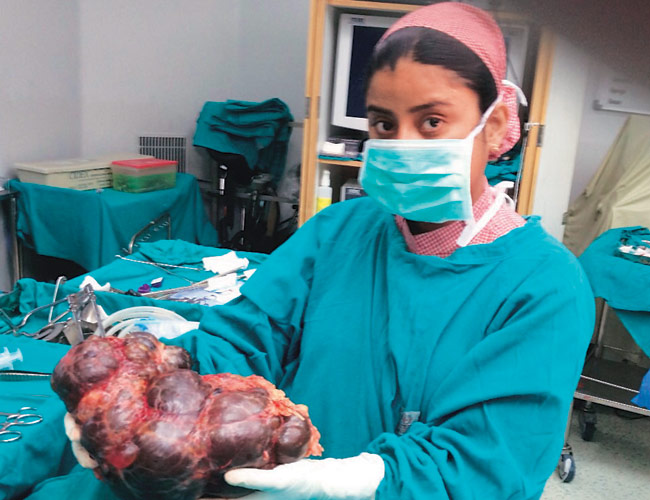
World’s largest kidney weighing about 2.75Kg and about the size of neonate removed by Indian doctors
A 45 year old man, whose whereabouts are not revealed joined the Guinness book of world records for the world’s largest kidneys. He visited Delhi’s prestigious Sir Ganga Ram Hospital(SGRM) in March, with complaints of severe abdominal pain, blood in urine and high fever.
Surgeons advised for an ultrasound scan, which revealed a shocking surprise, even the surgeons were stunned. The man had a colossal right kidney and an enormous left kidney.
Few years ago, he was identified to be suffering from a hereditary condition called Autosomal Dominant Polycystic Kidney Disease(ADPKD); for which he was on dialysis. He was due for renal transplant because of the illness, but the ultrasound report toppled the calculations.
Surgeons of SGRM hospital lead by senior consultant Dr. Manu Gupta, an urosurgeon planned for a surgery. Taking a huge challenge and high risk, surgeons conducted a marathon surgery to remove the kidney which was 20 times the size of a normal one.
“After a 3hr marathon and separating the adhesions with intestines, the world’s largest kidney measuring 2.75 Kg was removed.”
Dr. Manu Gupta adds that this happens to be the world’s largest kidney removed till date with the dimensions of this huge kidney being 33 X 20 X 20 cm.
A repeat surgery was also done after 1 week to remove the second kidney which was no less than his pair weighing an enormous 2.5 kg. The patient’s body was bearing an additional weight of little more than 5 kg.
Autosomal Dominant Polycystic Kidney Disease(ADPKD) factsheet
- ADPKD is an inherited systemic disorder which majorly affects kidneys.
- Also affect other organs like liver, brain, pancreas and arterial blood vessels.
- Diagnosed by imaging or molecular genetic testing.
- Nearly 50% of patients with this illness will develop end stage renal disease and will require dialysis or kidney transplantation.
- Abnormality in two genes has been identified to be responsible for ADPKD. In 85% of cases, it is due to abnormal PKD1 gene on chromosome 16 and in 15% of cases mutations in PKD2 is seen.
- Polycystic Kidney Disease currently has no cure. Treatment options available are only for symptomatic management to delay the onset of end stage kidney disease.
- Aspiration followed with sclerotherapy is done for simple renal cysts. In severe cases, nephrectomy is advised.
- For an end stage kidney disease, dialysis or renal transplant is considered.


